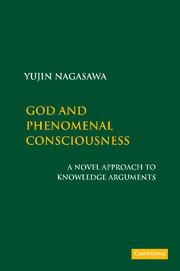Book contents
- Frontmatter
- Contents
- Preface
- PART I THE STRUCTURE OF KNOWLEDGE ARGUMENTS
- PART II KNOWLEDGE ARGUMENTS IN THE PHILOSOPHY OF RELIGION
- 2 Grim's Argument from Knowledge De Se
- 3 The Argument from Concept Possession (1)
- 4 The Argument from Concept Possession (2)
- PART III KNOWLEDGE ARGUMENTS IN THE PHILOSOPHY OF MIND
- PART IV KNOWLEDGE ARGUMENTS AND NONTHEORETICAL PHYSICALISM
- References
- Index
3 - The Argument from Concept Possession (1)
Published online by Cambridge University Press: 23 July 2009
- Frontmatter
- Contents
- Preface
- PART I THE STRUCTURE OF KNOWLEDGE ARGUMENTS
- PART II KNOWLEDGE ARGUMENTS IN THE PHILOSOPHY OF RELIGION
- 2 Grim's Argument from Knowledge De Se
- 3 The Argument from Concept Possession (1)
- 4 The Argument from Concept Possession (2)
- PART III KNOWLEDGE ARGUMENTS IN THE PHILOSOPHY OF MIND
- PART IV KNOWLEDGE ARGUMENTS AND NONTHEORETICAL PHYSICALISM
- References
- Index
Summary
INTRODUCTION
The primary concern for philosophers of religion for the last half century has undoubtedly been the argument from evil. The core of the argument is construed as an apparent inconsistency between divine attributes. According to the Anselmian tradition, God is a being such that He is necessarily omnipotent, necessarily omniscient, and necessarily omnibenevolent. However, the existence of evil in this world seems to show that either God could not have created the actual world such that it be free from evil (i.e., He is not omnipotent), He does not know our suffering from evil (i.e., He is not omniscient), or He does not care about our suffering from evil (i.e., He is not omnibenevolent). From these considerations about divine attributes, the argument concludes that a necessarily omnipotent, necessarily omniscient, and necessarily omnibenevolent God does not exist.
Similarly to the argument from evil, the argument from concept possession purports to derive the non-existence of God from premisses about considerations of divine attributes. It states that divine omniscience is not omniscience simpliciter because God's other attributes preclude Him from understanding fully certain concepts, possession of which requires Him to have particular experiences. For instance, according to one version of the argument, if God is necessarily omnipotent then He does not fully understand the concepts fear, frustration, and despair, possession of which require Him to have experienced fear, frustration, and despair. Therefore, the argument concludes, a necessarily omnipotent and necessarily omniscient God does not exist.
- Type
- Chapter
- Information
- God and Phenomenal ConsciousnessA Novel Approach to Knowledge Arguments, pp. 36 - 57Publisher: Cambridge University PressPrint publication year: 2008



